Under the auspices of His Excellency Mahmoud Abbas, President of the Palestinian National Authority, An-Najah University, Palestine Technical University-Kadoorie, and the University of Illinois Urbana-Champaign in the United States organized the First International Palestinian Conference on Nanotechnology for Advanced Material and Devices which was funded by the United States National Science Foundation NSF, and the Palestinian Telecommunication Group (PALTEL). The Conference was a unique event in the sense that it brought together local and international researchers and experts to share thoughts and knowledge in the field of nanotechnology and other related subjects.
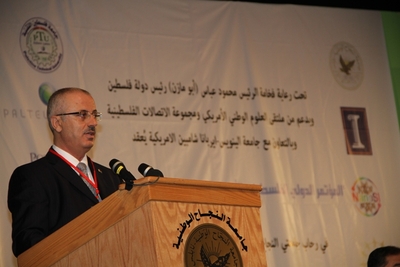
Attendees to the Conference included: Prof. Rami Hamdallah, President of An-Najah University, Dr. Hussein Al-A’raj, Head of the Palestinian Presidential Office as representative of President Mahmoud Abbas, Professor Sultan Abu Orabi Al-Adwan, Secretary General of the Association of Arab Universities (AARU), Professor Daoud Al-Za’tari, President of Palestine Technical University, Professor Munir Nayfeh, Head of the Conference’s Organizing Committee, Mr. Kamal Ratrout, Head of the Technical Department at PALTEL, Professor Ali Zaidan, President of Al-Aqsa University in Gaza, Professor Sandro Scandolo, Deputy Director of ICTP in Italy, Professor George Arida, Venture Investors, University Research Park- Madison, as well as presidents of a number of Palestinian, Arab and international universities, researchers and experts in the field of nanotechnology. The opening session was headed by Dr. Sulaiman Khalil, Dean of the Faculty of Science at An-Najah and Head of the Organizing Committee.
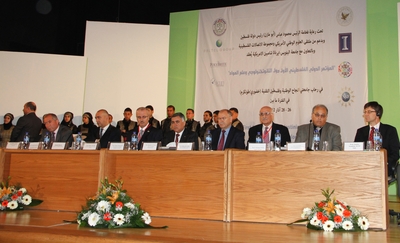
In the opening session, Prof. Hamdallah welcomed the participants and thanked President Abbas for supporting the event. He also welcomed Professor Abu Orabi to An-Najah and thanked him for his time and contribution to the field of higher education in Palestine and the Arab world. He also thanked Professor Nayfeh for his support and the National Science Foundation for its contribution to the funding of the Conference.
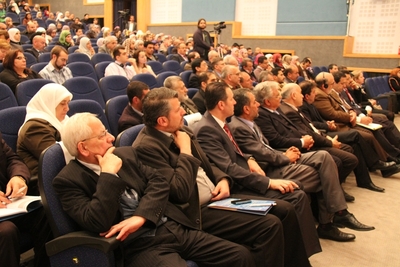
In his speech Prof. Hamdallah said: “From our humble beginning over 90 years ago, An-Najah has evolved into one of the premier institutions of higher learning in the Middle East. Our faculty and staff come from across Palestine and the world to provide an education system that is second to none. Our university is proud to offer critical research in applied sciences and new perspectives on studies in the humanities, while providing community services to the Palestinian people”.
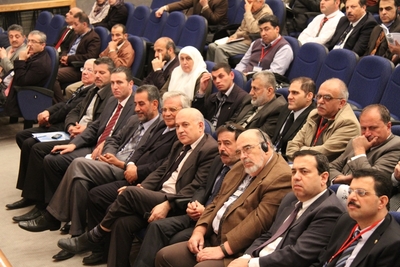
Moreover, the President spoke about the University’s establishment in 1918 and the development stages it went through over the years: “What began in 1918 as the An-Najah Nabulsi School has gone through many iterations prior to becoming the university that exists today. For the first 23 years of our existence, An-Najah Nabulsi School was in fact a primary school, providing critical early education. By 1941 however, it was time for the Nabulsi School to adapt to the changing needs of the Palestinian people. An-Najah Nabulsi School became An-Najah College and focused on preparing teachers through 2-year degree programs. In 1977, An-Najah underwent its most drastic transformation, becoming a four-year accredited institution offering courses through the Faculties of Science and Fine Arts. Renamed An-Najah National University, we quickly became a member of the Association of Arab universities and the International Association of Universities. Just as our academic offerings have expanded, so have our facilities and student body. While our original school had only one structure, An-Najah National University currently hosts four individual campuses, each offering state of the art technology. Our story is a Palestinian story of success. From our origins in primary education, we have become the largest university in Palestine with over 18,000 students currently enrolled. Imperative research carried out by our academic faculty leads the way in breakthroughs for the region”.
Additionally, he spoke about the University’s most ambitious projects which is the new Teaching Hospital that is currently under construction and promises to be a major contribution to the medical field in Palestine. “Once completed, this complex will give medical aid through a centralized administrative area while allowing An-Najah to train doctors and treat Palestinian patients. No longer will we lose our best students to foreign universities and internships, or see families torn apart seeking medical care abroad. This sustainable development project, planned in cooperation with the Palestinian Ministry of Health, will feature a main hospital, a cancer response facility and an eye treatment center”. The President said.
Regarding nanotechnology, Prof. Hamdallah said: “This is the promise of nano materials and nanoscience, that it holds the key to our future. Not just for science, but for civilization as a whole: Faster data processing, better medical care, and more productive agriculture. Nanotechnology offers the chance to completely change the paradigm of scientific applications, and we have barely begun to scratch the surface. The scientific innovations necessary to create this future can all be provided by nanotechnology. But such innovations do not come from a single person or laboratory. Scientific progress is built upon the labors of our peers and colleagues, and I hope you will all be able to use this conference to advance your own research or instruction while fostering the bond that underlies all scientific endeavors”.
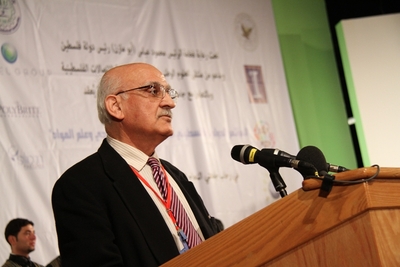
Professor Nayfeh said in his speech that this Conference came as a result of two years of continuous efforts and meetings between An-Najah University and the University of Illinois Urbana-Champaign. He also said that this meeting brings together experts in the field of nanotechnology and shall contribute to the discussion of issues related to this field of science.

Mr. Ratrout spoke about the interest of PALTEL in supporting such events which address some of the key issues in the field of science.
Professor Scandolo spoke about the importance of international cooperation in the field of information technology and explained that in nanotechnology the basic laws of nature interact with each other in order to develop this science further.
Dr. Al-Za’tari discussed the importance of using nanotechnology in the different fields, while Dr. Zaidan spoke about the important role of scientific innovations in applying nanotechnology in various fields of industry, in addition to speaking about the establishment of the Scientific Research Council and the specialized research centers that work in the field of nanotechnology.
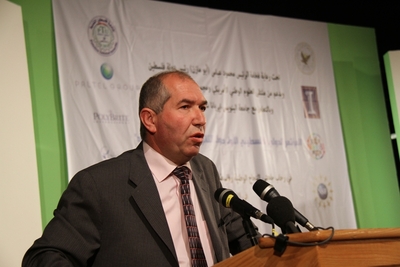
Dr. Arida described the Conference's important scientific papers, and praised the advanced level of development that An-Najah University has achieved over the years which is evident in its architecture and facilities.
Professor Abu Orabi spoke about the importance of scientific research in the life of people and said that the outcomes of scientific research in the Arab world are still few and limited and that there should be more focus on this field.
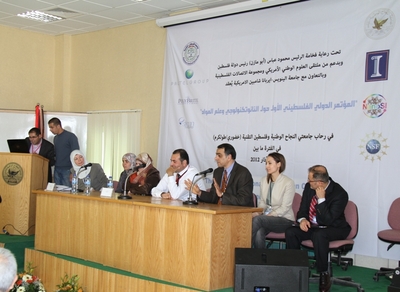
Dr. Al-A’raj delivered a speech on behalf of President Mahmoud Abbas in which he said the Conference represents the will of the Palestinian people to lead their country to excellence and development on all levels, and valued this initiative by An-Najah University. He also said that this event comes in a time in which the world is heavily dependant on technology especially with respect to nanotechnology and nano materials. This field is of great importance to the Palestinians since natural resources in Palestine are very limited and the only promising field will be technology in order to deal with the current challenges and problems.

The Palestinian National Authority has been deeply concerned with developing this sector which represents a promising field of investment in the future. Palestine is still at its beginnings with respect to technology use and development, but through continuous work and effort this field will grow in quality and scope to ensure a better future for the coming generations.
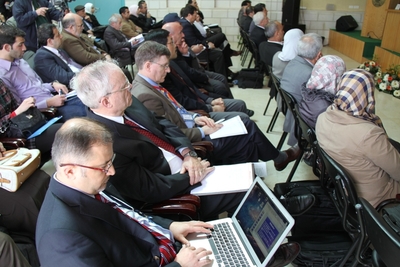
The occupation has been working on hindering the progress of education in Palestine by all means, and its practices have led to difficult situations on the ground. However, the Palestinians have become even more determined to continue building their country through supporting higher education and the establishing of more than 45 educational institutions throughout Palestine.
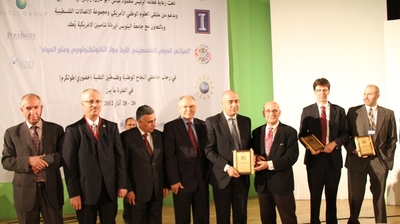
The Conference aimed to address the latest technologies that are related to the preparation of nano materials and applying them to the different modern fields, present the research activities related to Palestinian universities and institutions, evaluate the available potentials to conduct basic and applied research in the field of nanotechnology locally, prepare plans and recommendations that are needed for the development of this research and enable it to play its role in the development of sustainable development, in addition to promoting the nanotechnology and its importance among schools and universities in Palestine, emphasize the role of nanotechnology in serving the Palestinian society in the different medical, environmental, agricultural and industrial fields, and finally provide cooperation opportunities between Palestinian and international researchers.
عدد القراءات: 193





